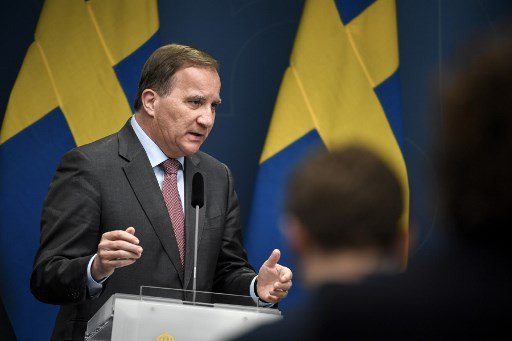Popular Reads
Top Results
Can't find what you're looking for?
View all search resultsPopular Reads
Top Results
Can't find what you're looking for?
View all search resultsAs Europe slowly exits lockdown, Sweden hunkers down for long haul
While people in other European countries have gradually begun returning to their workplaces in recent weeks, Swedes have been strongly advised to continue working from home, and possibly not just for weeks, but for months to come.
Change text size
Gift Premium Articles
to Anyone
S
weden has taken a soft approach to virus restrictions and although its rules are likely to be in place longer than in other countries, officials are adamant their strategy is a winner in the long term.
"This fight against COVID-19 is a marathon," Prime Minister Stefan Lofven said recently, adding that his officials "strongly believe" their measures are viable for the long haul.
While people in other European countries have gradually begun returning to their workplaces in recent weeks, Swedes have been strongly advised to continue working from home, and possibly not just for weeks, but for months to come.
The European Union has started planning for a phased restart of travel this summer but Sweden has told its residents they will have to holiday at home, extending a non-essential travel advisory until at least July 15 -- the middle of the country's main holiday month.
Other restrictions on travel, sport and care-home visits are also likely to remain in place even while other countries try to re-emerge from lockdowns.
However, Sweden never imposed full lockdown measures -- under-16s have continued to go to school, patrons have not been stopped from going to cafes, bars and restaurants.
Although people have been urged to limit contacts and practice social distancing, the restrictions are advisory.
"It's apparently reasonably easy to start a lockdown, but stopping it is much more difficult," state epidemiologist Anders Tegnell of the Public Health Agency told AFP.
He noted the difficulty of getting people to follow recommendations when "one day you're supposed to do this and the next you're supposed to do something else".
‘Future model'
Some have accused Sweden of playing Russian roulette with citizens' lives by allowing the virus to circulate slowly in society, with the main goal being to ensure the public healthcare system can keep pace.
The consequences are difficult to miss -- Sweden's death rate stood at 371 per million inhabitants on Tuesday, roughly eight times the rate in Norway and Finland, according to the Worldometer website.
However, although Sweden's hospitals have reported strained conditions, they have not been overwhelmed.
At the Danderyd Hospital in Stockholm's north, Klara Bergmark, head of the intensive care unit, told AFP that staff may be tired, but they are preparing to work at a heightened level over the summer and potentially "the whole year".
"Endurance is very important here, to be able to do this for a long time," Bergmark said.
Sweden's approach may be tough on some sections of society, but some experts see it as far-sighted, especially as one recent report from the University of Minnesota suggested "significant COVID-19 activity" was likely to be around for at least another two years.
"If we wish to get back to a society in which we don't have lockdowns, then society may need to adapt for a medium or potentially a longer period of time," WHO's emergencies chief Michael Ryan told a press conference in late April, suggesting Sweden could be a "future model".
"I think there may be lessons to be learnt from our colleagues in Sweden."
Unfazed by the criticism of Sweden's strategy, epidemiologist Tegnell said it was still too early to say whether an initial lockdown phase in Sweden -- like those in neighboring countries -- would have limited its mortality rate.
But he has suggested a second wave of the virus could be milder in Sweden than in countries where lockdowns were imposed.
"I think the Swedish strategy has proven to be sustainable. We get figures now that people are actually increasing their adherence to our advice, not decreasing," Tegnell said.










